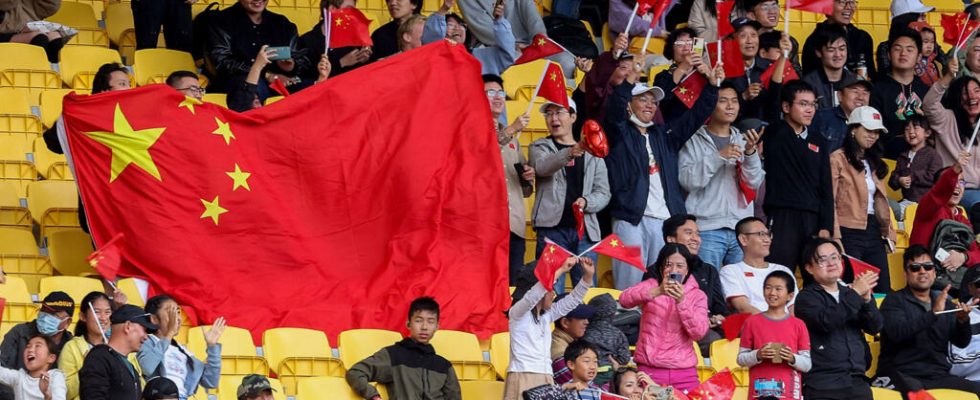Beijing on Monday, April 3 appointed a team of seven leaders to take over the Chinese Football Federation. The president and vice-president of the institution are accused of corruption while the local championship is struggling to recover from the real estate crisis and the Covid-19 epidemic.
The list of leaders who have been investigated for corruption continues to grow each week. Du Zhaocai is the latest. The vice-president of the Chinese Football Federation (CFA) joins his former superior, Chen Xuyuan, accused of “ serious violations of the law “, a vague and catch-all motif to signify that he has fallen into the nets of the anti-corruption campaign which affects the world of Chinese football.
Before him, in November 2022, it was Li Tie, then national team coach, who fell for the same reason. The news caused a stir in the country, as the former Everton midfielder is considered one of the best footballers in the country’s history. In total, nearly a dozen leaders of the Chinese federation are under similar investigation.
39 clubs have disappeared since 2020
At the same time, the Chinese Super League (CSL), the local championship, continues to lose feathers. Since 2020 and the spread of the coronavirus epidemic, 39 Chinese professional clubs have disappeared, like Jiangsu Suning FC, which went out of business in February 2021. Only a few months earlier, the club owned by the Chinese e-commerce giant Suning – also majority owner of Inter Milan in Italy – won the Chinese championship. Football has not escaped the paralysis that has affected the country, locked in its strict zero-Covid policy. For nearly three years, CSL meetings took place behind closed doors and in sanitary bubbles.
Guangzhou City announce operation suspension on Wednesday evening after failing to get permission to play in the 2023 Chinese football league. The announcement was issued at 6:23 pm. It symbolizes the date when the club started operation in Guangzhou: June 23, 2011. pic.twitter.com/GHv1uMnDi6
— Titan Sports Plus (@titan_plus) March 30, 2023
At the end of March, eight clubs were banned from professional football leagues by national authorities for unpaid wages or financial irregularities Among these teams, two of them have ceased operations: Shaanxi Chang’an Athletic FC and Guangzhou City FC. The latter is financed by R&F Properties, a property developer. For a long time robust, the sector was one of the great financiers of Chinese football, but real estate has collapsed, left millions of owners on the floor and weighed down the Chinese economy.
► To read also: China: in the wake of the fall of the real estate giant Evergrande, the economy falters
Symbol of the end of the golden age of this union between real estate and football, Guangzhou FC, the other city of Canton, was relegated last year to the second national level. Once called Guangzhou Evergrande, after the huge real estate conglomerate, the team coached by Fabio Cannavaro or Marcello Lippi – respectively captain and coach of world champion Italy in 2006 – dominated the CSL with eight titles in the 2010s and two Asian Champions Leagues. Sign of the ambitions of the real estate developer, Evergrande had launched, before the epidemic, the construction of its own stadium for a value of 1.8 billion dollars. Debt-riddenthe company had to cancel the project after two years of work.
Making China a soccer superpower
The decade of 2010 will be remembered as the golden period of Chinese football, where money flows freely. According to Fifa, the Chinese Super League spent two billion dollars on transfers over the period. During the 2016 transfer window alone, Chinese clubs wasted $450 million. This is the time when Ezequiel Lavezzi, Alex Teixeira or the Hulk tread the Chinese lawns, in search of a golden contract. But the leaders ended up turning off the tap and whistling the end of recess.
Because these crazy expenses are not compatible with the vision of Xi Jinping – self-proclaimed football fan – and the plan launched by the highest authorities of the country in 2016, namely to organize and win the Football World Cup by 2050. A crazy bet when the national team only played one World Cup in 2002 in South Korea and Japan for a record of three defeats and no goals scored. Above all, the plan was to make China a football superpower, like what has become the second world power economically. The initial effort was to focus on training the footballers of tomorrow in football schools.
Six years after the ambitions displayed by China, the national team still failed to qualify for the World Cup in Qatar, to the great despair of Chinese supporters. Faced with so many misadventures, power seems to want to change its tune. From now on, each professional club has an obligation to develop a women’s section in order to be able to compete in the professional championship. That’s good: women have a much better reputation in the country than their male counterparts and a much richer track record: eight Asian championship titles, a World Cup final and a silver medal at the Olympic Games. And the Steel Roses, their nickname, will be there for the Women’s World Cup in New Zealand this summer.
